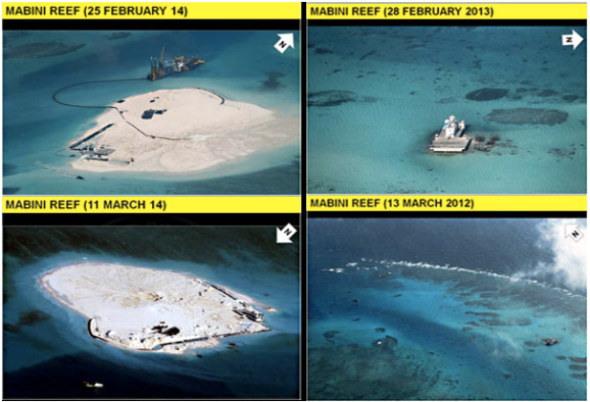China’s expanding Spratly outposts: artificial, but not so new
Posted: June 19, 2014 Filed under: China-ASEAN, China-Philippines, China-Vietnam, CMS (China Maritime Surveillance), South China Sea, Western media | Tags: artificial islands, CCTV, China, China Coast Guard, China Coastguard, China Marine Surveillance, china maritime dispute, China Maritime Surveillance, Chinese foreign policy, 礁堡, 高脚室, 高脚屋, First Island Chain, Gulf of Tonkin, HYSY-981, Johnson Reef, Johnson Reef South, Mabini Reef, Nanhai-9, New York Times, paracel islands, Paracels, reclamation, Sino-Vietnamese relations, south china sea, Spratly, spratly islands, UNCLOS, western media 3 Comments
China’s Johnson Reef (赤瓜礁) reclamation project, as photographed by the Philippines Navy (click for source)
Here’s another attempt at what a blog post probably should be: a short comment on some things i’ve read online. It’s about the New York Times’ report this week on China’s island reclamation work in the Spratlys, which i think missed some important background context to China’s activities.
The subject, in summary:
China has been moving sand onto reefs and shoals to add several new islands to the Spratly archipelago, in what foreign officials say is a new effort to expand the Chinese footprint in the South China Sea. The officials say the islands will be able to support large buildings, human habitation and surveillance equipment, including radar.
This island reclamation is the latest in a long line of measures China has taken since the early 1980s to strengthen its presence in the Spratly Islands, which it views as crucial due to their proximity to China’s sea approaches, as well as present (fisheries) and future (energy) resource bounties.
China’s Information Management in the Sino-Vietnamese Confrontation: Caution and Sophistication in the Internet Era
Posted: June 9, 2014 Filed under: China-Vietnam, Global Times, PRC News Portals, South China Sea, State media, TV, Weibo, Xinhua | Tags: CCP Propaganda Department, China-Vietnam, China-Vietnam relations, Chinese foreign policy, Chinese internet, Chinese internet censorship, Chinese patriotism, 理性爱国, 舆论引导, 西沙, HYSY-981, internet censorship, paracel islands, Paracels, Propaganda department, rational patriotism, Sino-Vietnamese incidents, south china sea, 南海, 南海问题, 宣传部, 海洋石油-981, 中越, 中越撞船 2 CommentsJamestown China Brief piece published last week:
~
China’s Information Management in the Sino-Vietnamese Confrontation: Caution and Sophistication in the Internet Era
China Brief, Volume 14 Issue 11 (June 4, 2014)
After the worst anti-China violence for 15 years took place in Vietnam this month, it took China’s propaganda authorities nearly two days to work out how the story should be handled publicly. However, this was not a simple information blackout. The 48-hour gap between the start of the riots and their eventual presentation to the country’s mass audiences exemplified some of the Chinese Communist Party’s (CCP) sophisticated techniques for managing information during fast-breaking foreign affairs incidents in the Internet era. Far from seizing on incidents at sea to demonstrate China’s strength to a domestic audience, the official line played down China’s assertive actions in the South China Sea and emphasized Vietnamese efforts to stop the riots, effectively de-coupling the violence from the issue that sparked them. This indicated that, rather than trying to appease popular nationalism, China’s leaders were in fact reluctant to appear aggressive in front of their own people.[1]
By framing the issue in this way, China’s media authorities cultivated a measured “rational patriotism” in support of the country’s territorial claims. In contrast to the 2012 Sino-Japanese confrontation over the Diaoyu Islands, when Beijing appears to have encouraged nationalist outrage to increase its leverage in the dispute,[2] during the recent incident the Party-state was determined to limit popular participation in the issue, thus maximizing its ability to control the escalation of the situation, a cornerstone of the high-level policy of “unifying” the defense of its maritime claims with the maintenance of regional stability (Shijie Zhishi [World Affairs], 2011).

